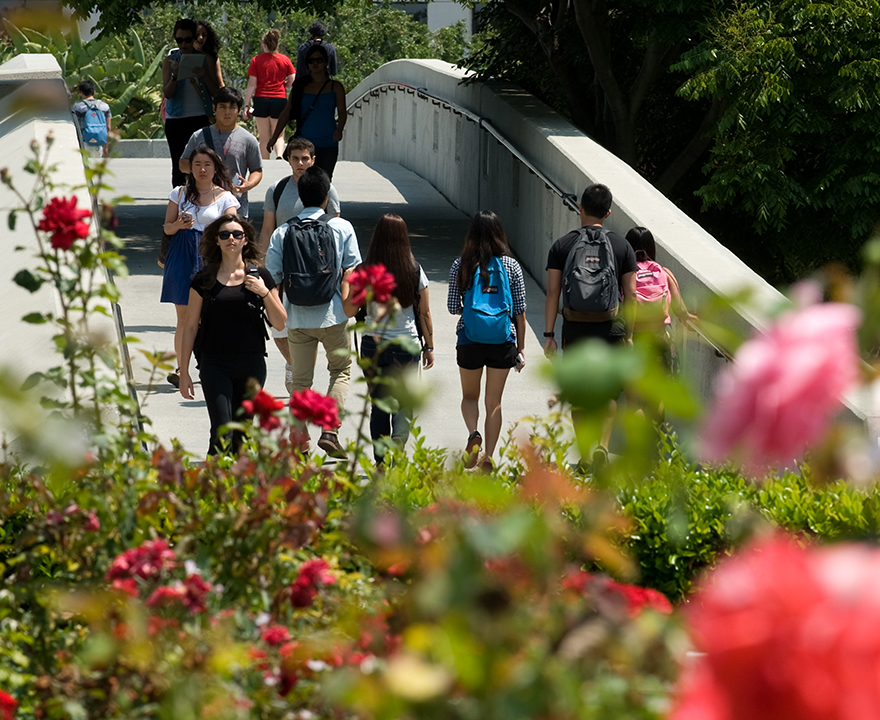Advancing equity in the age of COVID-19

Advancing equity in the age of COVID-19
- July 2, 2020
- Four from social sciences awarded funding to lead timely, cutting edge research projects
Four UCI social scientists are among UCI’s 19 faculty and resource center proposals receiving funding in response to a call aiming to understand: “Are We in this Together? Advancing Equity in the Age of COVID-19.” The awards are hosted by the Office of Inclusive Excellence Confronting Extremism Program, which seeks to forge dialogues and support inquiry and evidence-based practices aligned to campus values. Learn more about the social sciences projects below, and congrats to all funded researchers.
COVID-19 at the UCs: Mapping Inequalities and Advancing Inclusion for UC Students
with Immigrant Parents
Laura Enriquez, Assistant Professor, Chicano/Latino Studies
Project lead with collaborating researchers Annie Ro, Martha Morales, Elisabet Barrios,
Evelyn Sanchez and Mariel Calva
This project aims to examine how COVID-19 is disrupting college education and exacerbating inequalities among immigrant-origin students in the process. During the early phases of COVID-19, Enriquez and team fielded a survey of 2,400 UC students, split among undocumented students, U.S. citizen students with undocumented parents, and U.S. citizen students with legal immigrant parents. The researchers will now analyze this data to explore how students’ and their parents’ immigration status contribute to worse educational, wellbeing, and economic outcomes due to COVID-19. Findings will be featured in a UC-wide virtual townhall, and a UCI-hosted student art competition will solicit creative depictions of and responses to the research. Student art will be featured alongside research findings in pre-recorded mini-lectures made widely available for teaching purposes.
Orange County Community-Oriented Health Equity Contact Tracing (OC-CHECT)
Alana LeBrón, Assistant Professor, Chicano/Latino Studies
Project lead with collaborating researchers Sora Park Tanjasiri, Salvador Zarate,
Abigail Reyes, John Billimek, Cynthia Haq, Daniel Parker, Jun Wu and Bernadette Boden-Albala
COVID-19 cases are concentrated in low-income communities of color, reflecting enduring structural inequities exacerbated by the pandemic. This project involves a community-academic partnership focused on ensuring that equity and community priorities are central to COVID-19 responses in Orange County, with emphasis on low-income communities of color. A central component of pandemic mitigation, contact tracing (CT), refers to a process through which persons who have come into contact with someone diagnosed with COVID-19 are identified, notified, contacted for medical assessment, and quarantined or monitored. This project – including community leaders and UCI faculty/staff representing multiple disciplines – will develop guiding principles for CT models implemented in Orange County, recommend strategies for tailoring CT to the local social, economic, and political context and community priorities; inform contextually- and culturally-sensitive CT curricula; and conduct health equity assessment of Orange County CT models. This project is significant in that the expected outcomes can help mitigate the social and health inequities of COVID-19 and underlying structural inequities for OC low-income communities of color. This CT model has the potential for translation to have a positive impact in other contexts, such as other California communities hit hard by COVID-19, UCI (e.g., resuming in-person teaching), and future pandemics or disasters. This project will strengthen UCI’s service mission by catalyzing the engagement of community leaders and UCI scholars to advance inclusive excellence in COVID-19 decisions and programs implemented in OC.
Facing Digital Extremism in a Pandemic: New Modules and a Digital Toolkit to Confront
Disinformation
Bill Maurer, Dean, School of Social Sciences; Professor, Anthropology and Law; and
Director, Institute for Money, Technology and Financial Inclusion
This project expands the online, open courseware course developed with last year by creating two new teaching modules covering new forms of racial intimidation and harassment online taking place during the pandemic and the new coalition of white supremacists, science denialists and anti-vaccine advocates, which is driving new conspiracy-oriented online content. The aim is to educate teachers, public health professionals and concerned citizens, as well as to inoculate students against digital extremism. It will also create a toolkit for developing novel online content for social media platforms so that people can create and disseminate their own positive messages around the pandemic, public health, vaccines, and inclusion.
COVID-19 Problem Definition and Agenda-Setting in the American States
Graeme Boushey, Associate Professor, Political Sciences and Director, Jack W. Peltason
Center for the Study of Democracy
This project will explore how state governments have defined the problem of COVID-19
over time. Boushey will collect and analyze an exploratory data-set of state legislative
committee hearings in order to identify trends in state-level issue attention to the
COVID-19 epidemic. The research will produce new data on the ways that governments
across the states have defined the COVID-19 problem, how problem definition and the
generation of legislative alternatives have evolved over time, and how competing pressures
to mitigate health, economic, and social threats of COVID-19 have shaped policy-making
across different state governments.
Share on:
Related News Items
- On the move: Orange County United Way welcomes new chair for its United for Financial Security Leadership Council
- Reflecting on the assets and needs of Orange County's Asian American & Native Hawaiian and Pacific Islander communities
- A cap on credit card fees would hurt department stores most
- Maurer named chair of Orange County United Way United for Financial Security Leadership Council
- Healing and (Re)Building Connection Through Art




connect with us